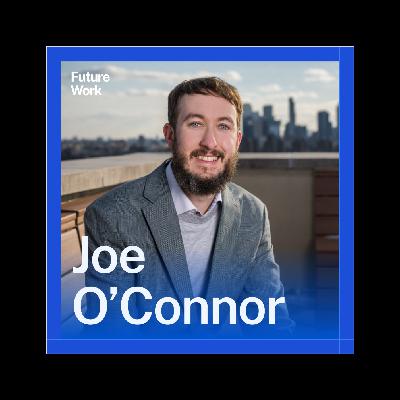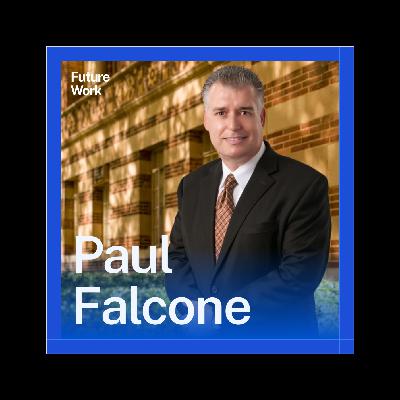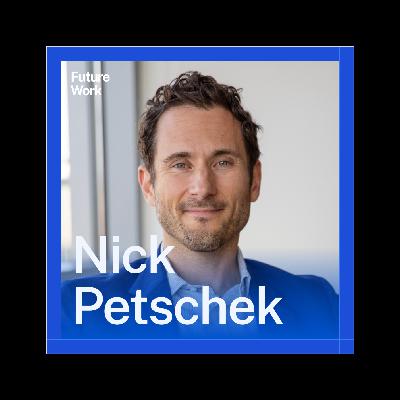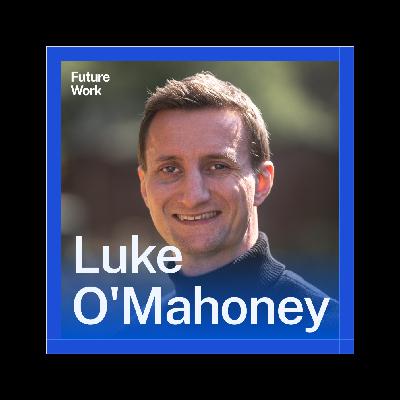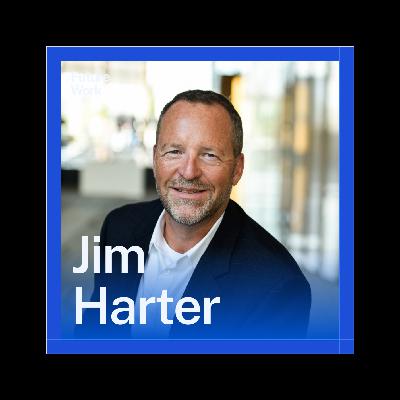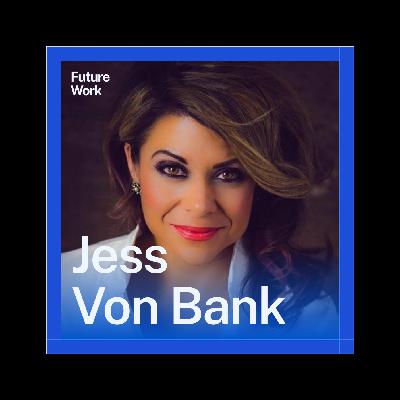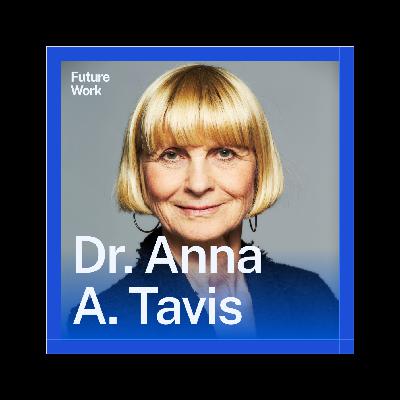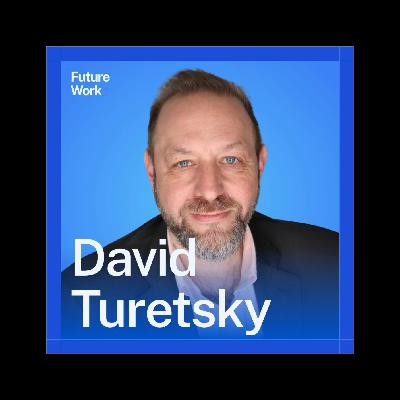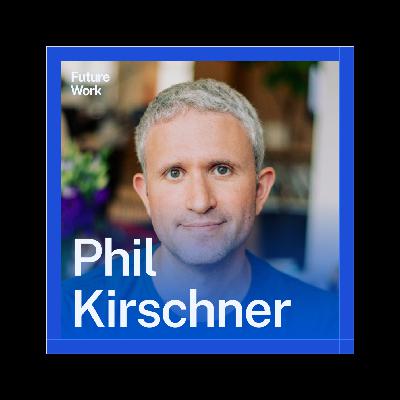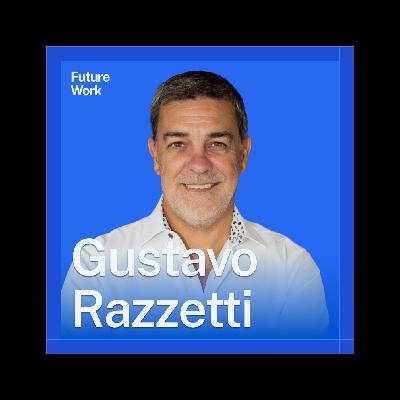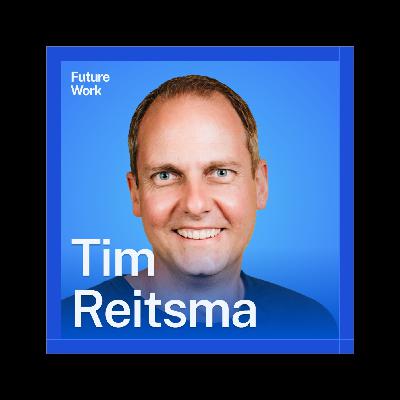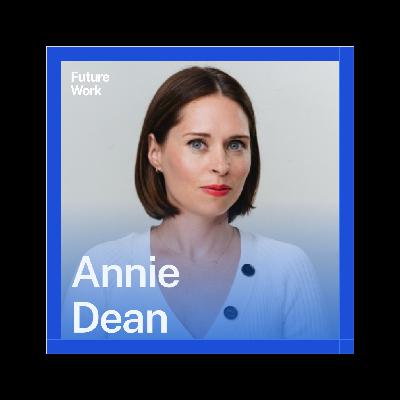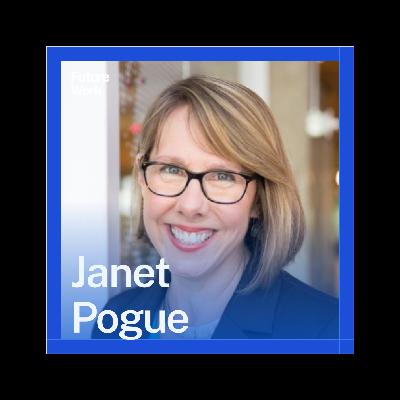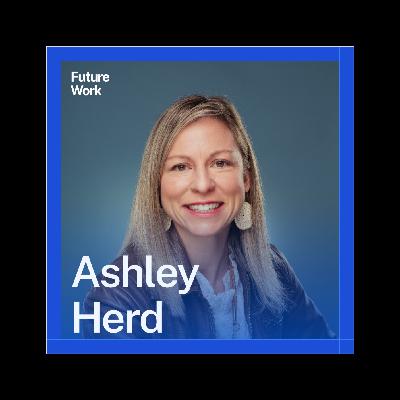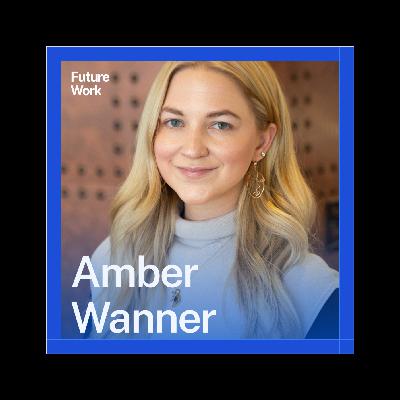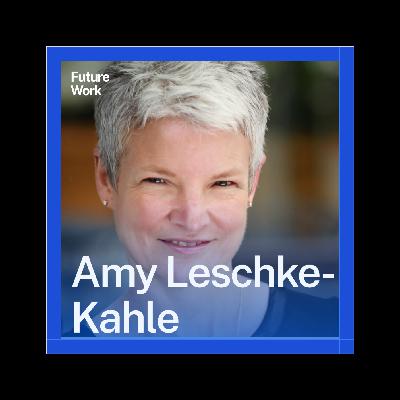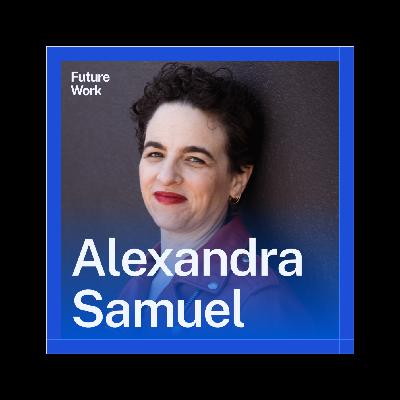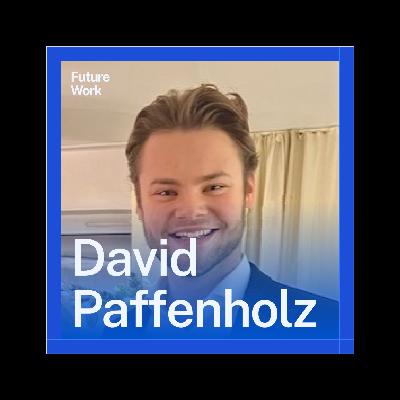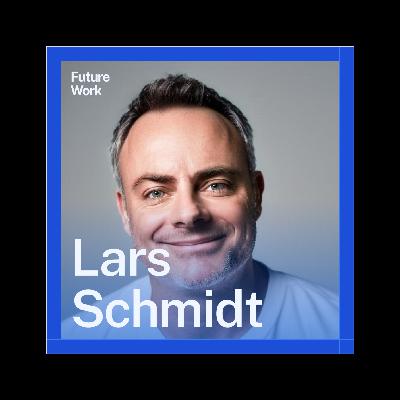Discover Future Work
Future Work

Future Work
Author: FlexOS
Subscribed: 2Played: 15Subscribe
Share
© FlexOS 2023
Description
Welcome to Future Work, a podcast on the happier future of work.
From company culture and remote work to data-driven employee experience and AI, we answer the question, “What does the real future of work look like, and how do we get there?”
The podcast is distributed across all major channels and reaches over 30,000 People and Workplace innovators globally.
Each episode is an interview with a renowned Future of Work, HR, or People leader to:
- Share a thought-provoking look at the future of work
- Provide practical tips to HR leaders who want to make a real impact
- Some of the topics covered in our Master Class include HR/Business Strategy Alignment, Total Rewards, Leadership and Management, Performance Management, Organizational Culture, Learning & Development (L&D), Workplace Experience, DEIB in the Workplace, HR Tech, Employee Engagement, Talent Acquisition, and Employer Branding.
Subscribe now to stay ahead of the curve and learn how to create a people-centric future of work. Join over 30,000 work futurists and subscribe to the newsletter.
55 Episodes
Reverse
This episode of Future Work is brought to you by Tactic: https://www.gettactic.com/work.Tactic is the #1 rated space logistics platform used by customers such as Microsoft, Redbull, the UN, and Northwestern University to create order out of the chaos. Tactic has a 100% customer satisfaction score on G2 because it was built from the ground up with the end user in mind. It’s an all-in-one solution for hot desking, room reservations, and visitor management.Visit Tactic today to unlock the power of hybrid work: https://www.gettactic.com/work.Our thanks to the Tactic team for sponsoring this episode!In this conversation, Tim Reitsma and Joe O'Connor discuss the concept of work time reduction, exploring its implications for productivity, employee engagement, and overall well-being. They delve into the differences between a four-day work week and broader work time reduction strategies, emphasizing the importance of addressing burnout and creating a culture that values time over money. The discussion highlights the role of AI in enhancing productivity and offers practical steps for organizations looking to implement these changes. Ultimately, the conversation advocates for a shift in workplace culture towards a more sustainable and fulfilling work environment.Takeaways:Work Time Reduction as a Productivity Strategy: Shorter workweeks, like the four-day model, enhance productivity and well-being by reducing inefficiencies and burnout including better rest, work-life balance, and psychological detachment from work.Work time reduction isn't one-size-fits-all: Options include nine-day fortnights, half-day Fridays, or shorter workdays. The key is adapting strategies to organizational needs and creating a bottom-up initiative.Changing Employee Priorities: Employees increasingly value time over salary, with many willing to trade pay raises for reduced hours.AI as a Key Enabler: AI streamlines tasks, enabling shorter workweeks while maintaining high performance.Leadership and Engagement: Success depends on leadership buy-in, clear goals, and employee-driven solutions, supported by a culture of continuous improvement.A Competitive Edge: Flexible work models help organizations attract and retain top talent in a competitive market.The Future of Work is About Outcomes, Not Hours: Organizations must prioritize results over time spent, with clear goals, accountability, and employee autonomy driving success.To get a notification of new episodes, sign up for the Future Work newsletter at: https://www.flexos.work/future-work.Reading more: www.flexos.work/learn/futurework-case-working-less-reduced-hours-drive-productivity
This episode of Future Work is brought to you by Tactic: https://www.gettactic.com/work.Tactic is the #1 rated space logistics platform used by customers such as Microsoft, Redbull, the UN, and Northwestern University to create order out of the chaos. Tactic has a 100% customer satisfaction score on G2 because it was built from the ground up with the end user in mind. It’s an all-in-one solution for hot desking, room reservations, and visitor management.Visit Tactic today to unlock the power of hybrid work: https://www.gettactic.com/work.Our thanks to the Tactic team for sponsoring this episode!In today’s episode of the Future Work Podcast, we’re excited to welcome Paul Falcone, a renowned HR leader, bestselling author of 17 books, and experienced executive with a career spanning Paramount Pictures, NBCUniversal, and more. With his works translated into six languages and over 750,000 copies sold, Paul has shaped leadership practices globally. He’ll share actionable insights on navigating AI’s evolving landscape while championing human-centric leadership, helping organizations tackle the challenges and opportunities of 2025.Takeaways:1. Prioritize Talent Development: Address talent scarcity by focusing on career ladders, certifications, and upskilling, ensuring long-term workforce readiness in a competitive market.2. Strengthen Emotional Intelligence (EI): Train leaders to build trust and inspire employees, fostering employee experience (EX) and driving discretionary effort, critical for retention and engagement.3. Leverage AI in HR: Use tools like Josh Bersin’s Galileo to enhance HR processes, from data analytics to personalized learning, while staying informed about AI’s limitations and opportunities.4. Adapt to Hybrid Work: Support hybrid work as an essential model for retaining talent, avoiding rigid in-office mandates that risk trust and employee satisfaction.5. Align with Gen Z’s Expectations: Prepare for the Zoomer workforce (60% by 2030) by emphasizing professional growth, diversity, inclusion, and work-life balance, training managers to act as mentors and coaches.To get a notification of new episodes, sign up for the Future Work newsletter at: https://www.flexos.work/future-work.Reading more: www.flexos.work/learn/futurework-the-future-hr-balancing-ai-human-centric
This episode of Future Work is brought to you by Tactic: https://www.gettactic.com/work.Tactic is the #1 rated space logistics platform used by customers such as Microsoft, Redbull, the UN, and Northwestern University to create order out of the chaos. Tactic has a 100% customer satisfaction score on G2 because it was built from the ground up with the end user in mind. It’s an all-in-one solution for hot desking, room reservations, and visitor management.Visit Tactic today to unlock the power of hybrid work: https://www.gettactic.com/work.Our thanks to the Tactic team for sponsoring this episode!In this conversation, Tim Reitsma and Nick Petschek explore the multifaceted nature of change in organizations, particularly in the context of HR and the future of work. They discuss the importance of adaptability, the role of HR in facilitating change, and the need for organizations to create a culture that embraces change rather than reacts to it. The conversation emphasizes the significance of understanding the 'why' behind changes, fostering connections in a digital world, and the necessity of training and introspection for individuals and organizations alike.Takeaways:Change is a constant in our lives and organizations.Creating adaptable organizations involves systems, culture, and individual capabilities.Proactive change is more effective than reactive change.A sense of urgency can be created without panic.HR plays a crucial role in leading change initiatives.Face-to-face interactions foster connection and urgency.Introspection is key to understanding resistance to change.Training alone is not enough; culture and systems must support change.Understanding the 'why' behind changes is essential for buy-in.Different individuals have varying thresholds for accepting change.To get a notification of new episodes, sign up for the Future Work newsletter at: https://www.flexos.work/future-work.Reading more: www.flexos.work/learn/futurework-future-work-starts-adaptability-insights-kotter
This episode of Future Work is brought to you by Tactic: https://www.gettactic.com/work.Tactic is the #1 rated space logistics platform used by customers such as Microsoft, Redbull, the UN, and Northwestern University to create order out of the chaos. Tactic has a 100% customer satisfaction score on G2 because it was built from the ground up with the end user in mind. It’s an all-in-one solution for hot desking, room reservations, and visitor management.Visit Tactic today to unlock the power of hybrid work: https://www.gettactic.com/work.In this conversation, Tim Reitsma and Luke Mahoney explore the evolving landscape of HR, emphasizing the importance of breaking down silos and shifting from traditional HR practices to a more integrated approach focused on people experience. They discuss the need for HR to view employees as customers, the role of AI in automating administrative tasks, and the significance of co-creation and user-centric design in developing effective HR strategies. The conversation highlights the necessity of flexibility in the workplace and the potential for HR to drive value creation rather than merely serving as a support function.Takeaways:Break HR Silos and Treat Employees as Customers: Traditional HR silos divide functions like L&D, talent acquisition, and DEI, leading to inefficiency and disconnection. By smashing these silos, HR can create unified people experiences. Treating employees as customers reframes their relationship with HR and encourages the creation of engaging, value-driven work experiences.Shift from Service Delivery to Value Creation: The transition from HR to people experience involves moving away from administrative tasks and focusing on how work experiences align with organizational goals. HR should operate as a strategic enabler, designing systems that create value for employees and drive business growth.Design Work as a Product: Work should be viewed as a product that employees subscribe to, fulfilling personal and professional needs over time. Continuous improvement, data-driven decision-making, and user-centered design principles (borrowed from product design) should guide HR initiatives.Leverage Automation and AI to Free HR for Strategic Work: Predictable and repeatable tasks should be automated, allowing HR professionals to focus on human-centered activities such as design, strategy, and employee engagement. Tools like inverted HR pyramids help visualize the shift from operational tasks to growth-focused work.Flexibility as a Fundamental Work Design Principle: Flexibility is no longer a perk but a requirement. The future of work integrates flexibility into its design, aligning with employees' evolving expectations and life needs. This shift has the potential to transform not just workplaces but broader societal structures.To get a notification of new episodes, sign up for the Future Work newsletter at: https://www.flexos.work/future-work.Reading more: www.flexos.work/learn/futurework-employees-customers-designing-unified-experience
This episode of Future Work is brought to you by Tactic: https://www.gettactic.com/work.Tactic is the #1 rated space logistics platform used by customers such as Microsoft, Redbull, the UN, and Northwestern University to create order out of the chaos. Tactic has a 100% customer satisfaction score on G2 because it was built from the ground up with the end user in mind. It’s an all-in-one solution for hot desking, room reservations, and visitor management.Visit Tactic today to unlock the power of hybrid work: https://www.gettactic.com/work.Our thanks to the Tactic team for sponsoring this episode!In this conversation, Tim Reitsma and Alex Her delve into the intricacies of employer branding, exploring its definition, importance, and the role of AI in shaping its future. They discuss the significance of self-reflection in branding, the integration of candidate experience, and the necessity of transparency in employer branding. Alex shares insights from his community on common challenges and trends, emphasizing the need for organizations to identify their unique value propositions and the importance of measuring ROI in employer branding efforts. The conversation concludes with actionable strategies for attracting top talent and mastering employer branding.Takeaways:Authenticity in Employer Branding: Building a strong employer brand means aligning your message with the actual culture of the organization. Candidates are drawn to authenticity, so presenting an accurate, relatable image is essential to attract and retain top talent.Candidate Experience as Part of the Brand: The candidate journey, from the career page to interviews, should reflect your brand’s values. Small details, like personalized communications and engaging media on the careers page, create a lasting impression and reinforce the brand's message.Leveraging AI for Efficiency: AI tools like GPT or Gemini can streamline employer branding tasks, from research to content creation. This frees up time for HR teams to focus on more strategic and creative aspects of the branding process.Employee Advocacy as a Branding Tool: Employee advocates naturally share their work experiences and amplify the brand’s message. Identifying and empowering these champions within the organization can enhance authenticity and broaden your reach.Employer Brand ROI: Employer branding can save companies money by reducing reliance on job boards and increasing time-to-fill metrics. Measurable ROI may come from a reduction in recruitment costs and faster hiring times.Community and Continual Learning: Engaging in communities (like Alex’s EB Space) and industry events keeps employer branding professionals updated on trends and best practices. This shared knowledge enables teams to adapt and innovate in an evolving field.To get a notification of new episodes, sign up for the Future Work newsletter at: https://www.flexos.work/future-work.Reading more: www.flexos.work/learn/futurework-candidate-journey-employee-advocates-crafting-lasting-employer-branding
This episode of Future Work is brought to you by Tactic: https://www.gettactic.com/work.Tactic is the #1 rated space logistics platform used by customers such as Microsoft, Redbull, the UN, and Northwestern University to create order out of the chaos. Tactic has a 100% customer satisfaction score on G2 because it was built from the ground up with the end user in mind. It’s an all-in-one solution for hot desking, room reservations, and visitor management.Visit Tactic today to unlock the power of hybrid work: https://www.gettactic.com/work.Our thanks to the Tactic team for sponsoring this episode!In this episode, Tim Reitsma sits down with Jim Harter, Chief Scientist for Workplace Management and Wellbeing at Gallup, to explore the critical role of leadership in driving employee engagement. They discuss the importance of taking actionable steps to foster a culture where employees feel connected, empowered, and motivated. Jim emphasizes that engagement isn’t just about making people happy—it's about creating clarity, trust, and a sense of purpose within organizations. He also highlights that improving engagement starts with just one small step and explains how linking engagement metrics to organizational performance can lead to significant business outcomes.Takeaways:Leadership is Key: Employee engagement starts with strong leadership that promotes clear communication, role clarity, and accountability.Start with One Actionable Step: Improving engagement doesn’t have to be overwhelming—just start with one small, intentional action to begin the process.Tie Engagement to Performance: The most successful organizations link engagement metrics directly to performance outcomes like productivity and employee retention.Trust and Clarity Drive Engagement: Trust is foundational, and employees who have clear expectations are more likely to feel engaged and perform well.High-Performing Organizations Sustain Engagement: Top organizations maintain high engagement levels by making engagement an ongoing priority, even during challenging times.To get a notification of new episodes, sign up for the Future Work newsletter at: https://www.flexos.work/future-work.Reading more: www.flexos.work/learn/futurework-employee-engagement-sense-purpose-leadership-is-key
This episode of Future Work is brought to you by Tactic: https://www.gettactic.com/work.Tactic is the #1 rated space logistics platform used by customers such as Microsoft, Redbull, the UN, and Northwestern University to create order out of the chaos. Tactic has a 100% customer satisfaction score on G2 because it was built from the ground up with the end user in mind. It’s an all-in-one solution for hot desking, room reservations, and visitor management.Visit Tactic today to unlock the power of hybrid work: https://www.gettactic.com/work.Our thanks to the Tactic team for sponsoring this episode!In this episode, Anna Tavis discusses the future of HR, emphasizing the growing importance of personalization in the workplace. She explains how HR is evolving from managing employees as a collective group to tailoring support for individuals using AI-driven tools like digital coaching. This shift toward personalization is critical for creating environments where all employees can thrive. Anna also highlights how this approach can improve employee performance, inclusivity, and overall organizational success.Main Takeaways:Talent Acquisition is Too Narrow: Traditional recruitment is often transactional and focused on immediate needs. Shifting to a broader talent strategy that focuses on long-term development, internal mobility, and strategic workforce planning is key to success in the future of work.Technology as a Game-Changer: AI and automation are transforming recruiting by making processes faster, more inclusive, and more efficient. However, human oversight is still crucial to ensure decisions are empathetic and reduce bias.Internal Mobility is Underutilized: Organizations often overlook the talent they already have. By understanding and developing employees' current skills and interests, companies can fill roles internally rather than relying on external hiring, improving efficiency and morale.Personalization at Scale: Technology offers a huge opportunity to create more personalized candidate experiences, from acknowledging applications to nurturing talent pools, which can result in stronger relationships and long-term success for the organization.The Human Touch Still Matters: While technology can streamline processes, empathy and human connection should remain central to recruitment strategies. A personalized, respectful approach will make the difference in a competitive talent market.To get a notification of new episodes, sign up for the Future Work newsletter at: https://www.flexos.work/future-work. Reading more: www.flexos.work/learn/futurework-from-recruiter-to-talent-strategist-technology-personalization-human-connection
This episode of Future Work is brought to you by Tactic: https://www.gettactic.com/work.Tactic is the #1 rated space logistics platform used by customers such as Microsoft, Redbull, the UN, and Northwestern University to create order out of the chaos. Tactic has a 100% customer satisfaction score on G2 because it was built from the ground up with the end user in mind. It’s an all-in-one solution for hot desking, room reservations, and visitor management.Visit Tactic today to unlock the power of hybrid work: https://www.gettactic.com/work.Our thanks to the Tactic team for sponsoring this episode!In this episode, Anna Tavis discusses the future of HR, emphasizing the growing importance of personalization in the workplace. She explains how HR is evolving from managing employees as a collective group to tailoring support for individuals using AI-driven tools like digital coaching. This shift toward personalization is critical for creating environments where all employees can thrive. Anna also highlights how this approach can improve employee performance, inclusivity, and overall organizational success.Main Takeaways:Personalization is the Future of HR: Moving away from one-size-fits-all models, HR must adopt personalized approaches that cater to the unique needs of each employee, allowing everyone to perform at their best.AI is Transforming Employee Support: AI-driven tools, like digital coaching, make personalized employee support scalable and cost-effective, helping organizations provide real-time guidance tailored to individual needs.Inclusivity is More Granular: Personalization enables a more nuanced approach to diversity and inclusion, ensuring all employees, regardless of background or specific needs, feel supported and valued.Shifting from Reactive to Proactive HR: Personalized strategies prevent small issues from growing into bigger problems, ultimately reducing costs associated with turnover, retraining, and lost productivity.HR’s Role in Competitive Advantage: Companies that embrace personalization will attract top talent, increase productivity, and gain a competitive edge by fostering an environment that truly supports employee well-being and success.To get a notification of new episodes, sign up for the Future Work newsletter at: https://www.flexos.work/future-work.Reading more: www.flexos.work/learn/futurework-future-hr-personalization-ai-human-centered-workplace
This episode of Future Work is brought to you by Tactic: https://www.gettactic.com/work.Tactic is the #1 rated space logistics platform used by customers such as Microsoft, Redbull, the UN, and Northwestern University to create order out of the chaos. Tactic has a 100% customer satisfaction score on G2 because it was built from the ground up with the end user in mind. It’s an all-in-one solution for hot desking, room reservations, and visitor management.Visit Tactic today to unlock the power of hybrid work: https://www.gettactic.com/work.Our thanks to the Tactic team for sponsoring this episode!In this conversation, Tim Reitsma and David Turetsky explore the evolving landscape of total rewards in the context of the future of work. They discuss how total rewards have expanded beyond traditional compensation to include elements like career development, culture, and employee engagement. David emphasizes the importance of viewing HR as a business function rather than a cost center, advocating for investment in employee training and upskilling. The discussion also touches on the need for personalization in total rewards and the importance of clear communication with CFOs regarding the ROI of HR initiatives. Overall, the conversation highlights the critical role of HR in shaping a successful and engaged workforce in the modern business environment.TakeawaysTotal rewards are more than just compensation: They encompass salary, benefits, career development, culture, and upskilling, all of which contribute to motivating employees and driving business success.Shift HR from a cost center to a business function: HR needs to be viewed as a value-generating function, where investments in people are seen as strategic contributions to the organization’s long-term goals.Upskilling is critical for future success: Investing in employee development, particularly in areas like AI and emerging technologies, is crucial for staying competitive and adapting to the future of work.Personalization is the future of rewards: Companies should consider offering flexible reward structures that cater to individual employee needs, such as health spend accounts or customizable compensation packages.Communicate ROI of HR initiatives effectively: HR leaders need to collaborate with finance and other departments to demonstrate the ROI of total rewards and training programs, positioning them as investments rather than costs.To get a notification of new episodes, sign up for the Future Work newsletter at: https://www.flexos.work/future-work.Reading more: www.flexos.work/learn/futurework-from-cost-center-to-business-function-the-power-of-total-rewards-in-hr
This episode of Future Work is brought to you by Tactic: https://www.gettactic.com/work.Tactic is the #1 rated space logistics platform used by customers such as Microsoft, Redbull, the UN, and Northwestern University to create order out of the chaos. Tactic has a 100% customer satisfaction score on G2 because it was built from the ground up with the end user in mind. It’s an all-in-one solution for hot desking, room reservations, and visitor management.Visit Tactic today to unlock the power of hybrid work: https://www.gettactic.com/work.Our thanks to the Tactic team for sponsoring this episode!In this conversation, Tim Reitsma and Phil Kirschner explore the evolving landscape of work, particularly in the context of HR's role in shaping employee and workplace experiences. They discuss the impact of COVID-19 on workplace dynamics, the importance of data-driven decision-making, and the need for transparency and authenticity in leadership. The conversation also delves into the significance of measuring social capital, creating purposeful workspaces, and future-proofing organizations in a rapidly changing work environment.TakeawaysThe future of work is constantly evolving, influenced by technology and employee expectations.HR professionals are increasingly responsible for managing workplace experiences.Data-driven decisions can significantly enhance employee engagement and retention.Employee experience is influenced by workplace design and management practices.Hybrid work models require clear communication and intentionality from leadership.Measuring social capital is essential for understanding employee connectivity and engagement.Transparency in leadership fosters trust and aligns employee expectations with organizational goals.Purposeful workspaces should enhance productivity and collaboration.Future-proofing organizations involves anticipating changes in work dynamics and employee needs.Authenticity in communication is crucial for maintaining employee morale and engagement.To get a notification of new episodes, sign up for the Future Work newsletter at: https://www.flexos.work/future-work.Reading more: www.flexos.work/learn/futurework-people-places-purpose-hrs-role-shaping-tomorrows-workplace
This episode of Future Work is brought to you by Tactic: https://www.gettactic.com/work.Tactic is the #1 rated space logistics platform used by customers such as Microsoft, Redbull, the UN, and Northwestern University to create order out of the chaos. Tactic has a 100% customer satisfaction score on G2 because it was built from the ground up with the end user in mind. It’s an all-in-one solution for hot desking, room reservations, and visitor management.Visit Tactic today to unlock the power of hybrid work: https://www.gettactic.com/work.Our thanks to the Tactic team for sponsoring this episode!In this episode of the FlexOS "Masterclass" series, host Tim Reitsma speaks with workplace culture expert Gustavo Razzetti to explore HR's evolving role in shaping and sustaining workplace culture. From the foundational ABCs of culture—alignment, belonging, and collaboration—to navigating hybrid work models, the conversation delves into how HR leaders can guide organizations in defining their culture amidst the challenges of the future of work. Together, Tim and Gustavo uncover practical insights on leadership, trust, and the integration of AI, ensuring that HR remains at the forefront of cultural transformation.Summary:In this insightful discussion, Gustavo Razzetti shares his expertise on workplace culture, offering a framework known as the ABCs: Alignment, Belonging, and Collaboration. He explains how HR professionals play a crucial role in creating the conditions for these cultural elements to thrive. As they tackle the challenges of hybrid work, remote work, and the rise of AI, Tim and Gustavo provide actionable advice for HR leaders on balancing organizational rules with flexibility, facilitating difficult conversations with leaders, and maintaining authentic communication. The episode encourages HR professionals to think creatively about culture and to view their role as essential in fostering collaboration and connection in the workplace of the future.Key Takeaways:The ABCs of culture—Alignment, Belonging, and Collaboration—are essential for fostering a positive workplace environment.HR's role has shifted from being solely responsible for culture to acting as "godparents" of culture, providing guidance without full ownership.Hybrid work policies should be flexible, and designed around the work itself rather than rigid schedules.AI is transforming HR, but HR leaders must be cautious of losing the human element in decision-making.Authenticity and curiosity are key for HR leaders in building trust and navigating difficult conversations with leadership.To get a notification of new episodes, sign up for the Future Work newsletter at: https://www.flexos.work/future-work.Reading more: www.flexos.work/learn/reimagining-hr-for-2024-building-culture-with-clarity-and-curiosity
This episode of Future Work is brought to you by Tactic: https://www.gettactic.com/work. Tactic is the #1 rated space logistics platform used by customers such as Microsoft, Redbull, the UN, and Northwestern University to create order out of the chaos. Tactic has a 100% customer satisfaction score on G2 because it was built from the ground up with the end user in mind. It’s an all-in-one solution for hot desking, room reservations, and visitor management. Visit Tactic today to unlock the power of hybrid work: https://www.gettactic.com/work. Our thanks to the Tactic team for sponsoring this episode!Next episode, we’re launching The Future of HR Master Class, where HR leaders will explore key topics like company culture, workplace experience, total rewards, change management, .. all through the lens of hybrid work, AI and technology, workforce expectations, and evolving business needs.And like the past three seasons, where I’ve interviewed guests like Josh Bersin, Annie Dean, Dave Ulrich, and Ashley Herd, we have an amazing line-up of guests to discuss the role of HR in the future of work.But one thing will be different: I won’t be asking the questions.As FlexOS develops further, and the future of work gets more complex, I wanted to hand over the microphone to someone who understands this topic more deeply.I found that person in Tim Reitsma. Tim has been an editorial advisor with FlexOS for over a year and is the perfect person to spearhead season 4 of the podcast. Tim is an HR leader and a believer that a happier future of work is not only necessary but also possible.He also runs an organization called Invisible Condition that focuses on normalizing conversations around non-apparent illnesses and disabilities, reducing stigma, and enhancing understanding.To introduce Tim further to you, I thought I’d interview him. In this episode, you’ll hear from Tim about:The evolving role of HR from tactical execution to strategic leadership.The need for HR to align more closely with business objectives.The future of workspaces and HR’s responsibility in managing hybrid, remote, and office environments.The integration of AI into HR processes and how AI can enhance HR’s strategic role.The increasing importance of disability inclusion and creating spaces where employees can perform at their best.Setting healthy boundaries and prioritizing tasks within HR roles to avoid burnout, and leveraging curiosity as a tool for HR to navigate the uncertain future of work.Join Tim next week for his first episode as a host, where he interviews the famous Company Culture thinker Gustavo Razzetti on the future of HR in building amazing cultures.To get a notification of new episodes, sign up for the Future Work newsletter at: https://www.flexos.work/future-work#podcastReading more: www.flexos.work/learn/futurework-promising-a-masterclass-for-hr-in-future-of-work.
Hybrid work is here to stay, but are you making the most of it? Join us on July 8th for "The Hybrid Work Dilemma." - https://www.flexos.work/hybrid2024.Learn how to do more with less office space while increasing productivity, collaboration, and employee engagement. It's a chance to get inspired and connect with peers in a live roundtable to tackle your hybrid work challenges.Thanks to Tactic, the #1 rated space logistics platform used by customers such as Microsoft, Redbull, and the UN, for making this event possible. Visit Tactic today to unlock the power of hybrid work: https://www.gettactic.com/work.In today’s episode, we explore AI and modern work with Annie Dean, the VP of Team Anywhere at Atlassian, the largest distributed work company in the world.Annie has advocated for flexible work for over ten years, stemming from her own needs as a new mom, but in this episode, we shift the conversation from WHERE we work to HOW we work. We discuss how to work more effectively, AI's profound impact on productivity and collaboration, its broader implications for workplace diversity and inclusion, and Annie's inspiring vision for the future of work. Here are the actionable key takeaways from the conversation:Default to Digital-First Norms. The way Atlassian works today has proven that the office no longer needs to be a dependency for how great work gets done. Digital-first approaches optimize work efficiency, especially now that AI fuels even more seamless collaboration and information access. Shift towards digital-first practices and utilize AI tools to enhance productivity and reduce dependency on costly physical office spaces.2Reduce Ineffective Collaboration. Fortune 500 companies collectively waste 25 billion hours a year on ineffective work, preventing people from doing the deep and creative work they crave. F500 CEOs believe their teams can get the same amount done in half the time, but their people are wasting time being stuck in a system that they can't win against. Annie’s study found that a lack of clarity on goals, a lack of knowledge sharing, and too much distraction are the three main reasons we are now getting our best work done.Leverage AI To Further Boost Effective Work And Collaboration. AI can solve the challenge of information being in many people's heads or even digitally dispersed in various accounts, email threads, and Slack channels.Change Your Own Way of Working. Many of these lessons can start small. Working differently yourself can help you model the right behaviors to your teams. Then, sponsor your employees to do the same. Think actively with your team members about how to attack the work they need to do.Embrace Modern Work to Promote Inclusivity. As Annie said, “So much of the story about women's place in leadership and in their fulfillment and growth in their careers is about logistics. Their access to higher salaries was actually a question of logistics, not intent, talent, or drive.” Make logistics work for everyone by making work digital and providing flexibility to accommodate the realities of people’s daily lives. This way, we can fulfill Annie’s wish of having the people who have been left out of the workforce until now run our companies in ten years.Like reading more than listening? Find the article on our website: www.flexos.work/learn/annie-dean-how-we-work-trumps-where-we-work
Hybrid work is here to stay, but are you making the most of it? Join us on July 8th for "The Hybrid Work Dilemma." - https://www.flexos.work/hybrid2024.Learn how to do more with less office space while increasing productivity, collaboration, and employee engagement. It's a chance to get inspired and connect with peers in a live roundtable to tackle your hybrid work challenges.Thanks to Tactic, the #1 rated space logistics platform used by customers such as Microsoft, Redbull, and the UN, for making this event possible. Visit Tactic today to unlock the power of hybrid work: https://www.gettactic.com/work.In today’s episode, we talk with Janet Pogue, the Global Director of Workplace Research at Gensler, about office design in 2024.Janet shares her insights from over twenty years of research, including their latest study, which covered 15 countries and 16,000 office workers.We’ll discuss how the pandemic has accelerated changes in workplace expectations, the essential elements of high-performing workspaces, and practical tips for making your office a place where people truly want to be.Here are the actionable key takeaways from the conversation:High-Performing Workspaces: Many offices remain unchanged post-pandemic, despite significant shifts in how we work. As Janet says, people now spend about half of their workweek in the office, and more than ever, they come into the office to focus and get their work done. Evaluate and update your office to align with new work habits and expectations. With more spaces for focused work, cocreation, informal and confidential conversations, hybrid meetings, and wellbeing. And, make sure you involve employees in the design process to increase their engagement and satisfaction with the workspace. As Janet said: "When people feel like they had a say, they now have ownership."Balancing Function and Experience: Successful workspaces balance functional efficiency with creating an engaging, welcoming environment. But it’s not space alone. We need to be intentional about the experience by hosting events, and having team and core days, all to create a sense of vibrancy so that offices are a carrot, not a stick. For innovation, the lifeblood of companies, to flourish, you need to have more people across teams, not just within a team. So, beyond the office design, think about why people want to be there and how you facilitate this.Leveraging Third Spaces: I loved Gensler's finding that you can extend the functionality and appeal of your office by using third spaces like coffee shops. With employees already spending a third of their week outside of the office and home, help them find more opportunities to tap into coworking spaces, libraries, coffee shops, and outdoor spaces to complement the office setting.Improving Technology: Effective technology integration is essential for successful hybrid work environments. As Janet said, almost every meeting will have someone joining remotely. Invest in technology that enhances communication and collaboration, ensuring remote and in-office workers are equally engaged. This includes not just better microphones and cameras but also optimizing the room's acoustics.Like reading more than listening? Find the article on our website: www.flexos.work/learn/reimagining-office-gensler-janet-pogue-space-design-new-era
Hybrid work is here to stay, but are you making the most of it? Join us on July 8th for "The Hybrid Work Dilemma." - https://www.flexos.work/hybrid2024.Learn how to do more with less office space while increasing productivity, collaboration, and employee engagement. It's a chance to get inspired and connect with peers in a live roundtable to tackle your hybrid work challenges.Thanks to Tactic, the #1 rated space logistics platform used by customers such as Microsoft, Redbull, and the UN, for making this event possible. Visit Tactic today to unlock the power of hybrid work: https://www.gettactic.com/work.In today’s episode, I welcome Ashley Herd, a lawyer turned management trainer whose TikToks and YouTube videos reach over 5 million views a month.This reach gives Ashley an amazing insight into the real sentiment of employees and managers, which she combines with data from doing corporate leadership training at scale.We'll discuss the importance of respect in the workplace, managers' untapped potential, and AI's evolving role in leadership. A great episode if you deal with remote teams, navigate hybrid work environments, or want to improve your managers.Here are the actionable key takeaways from the conversation:Respect and Humanity in the Workplace: Ashley sees a lot of unfiltered feedback on the world of work in her video comments. Combined with corporate training, it’s taught her that when employees feel valued and respected, morale and productivity are significantly boosted. Ensure you foster an environment where respect and empathy are central. Regularly check in with your team to understand their needs and concerns, and make people feel they matter in things like being able to take time off and getting credit for their work.The Ripple Effect of Good Management: Effective management goes beyond getting the work done well; it's about positively influencing and inspiring teams. But it goes further: As Ashley said: "Managers have a potential for ripple impact on their teams and often don't know how to harness it." So, invest in manager training programs that focus on empathy, communication, and leadership skills. Give them the autonomy to manage well and not have to run to HR every time.Driving Performance with Empathy: Performance is important, but don’t forget empathy to create a balanced and effective management style. Focus on understanding your team's needs and aligning them with organizational goals for optimal performance.Balancing Remote and Hybrid Work: Remote work requires a shift in management style, focusing more on outcomes than hours worked. As Ashley said, "Managers often worry about what their remote teams are doing, but it's about setting clear expectations and trust." Set clear goals and expectations for your remote teams. Use regular check-ins to maintain engagement and address any concerns.Like reading more than listening? Find the article on our website: www.flexos.work/learn/empathy-efficiency-ashley-herds-viral-management-tips
Hybrid work is here to stay, but are you making the most of it? Join us on July 8th for "The Hybrid Work Dilemma." - https://www.flexos.work/hybrid2024.Learn how to do more with less office space while increasing productivity, collaboration, and employee engagement. It's a chance to get inspired and connect with peers in a live roundtable to tackle your hybrid work challenges.Thanks to Tactic, the #1 rated space logistics platform used by customers such as Microsoft, Redbull, and the UN, for making this event possible. Visit Tactic today to unlock the power of hybrid work: https://www.gettactic.com/work.In today’s episode, we meet Amber Wanner, founder of Vette, who’s using AI to make recruiting more human.We'll discuss how Amber’s methods provide instant, meaningful conversations, not just interviews, often with people in similar roles who may be suited better for that conversation than a recruiter.Here are the actionable key takeaways from the conversation:Making People Feel Valued: Amber said her purpose is to show as many people in the world that they matter. Recruitment can feel like a plight, but try to reenergize your process to emphasize human connection.Instant Interviews: When you let people choose when to interview, as Vette does, you see that people choose to interview much faster than the usual process, and over 50% of the time outside of office hours. Does your current recruiting process support this?From Interviews to Conversations: Amber is dedicated to transforming hiring from traditional interviews to conversations. She believes in allowing colleagues and individuals familiar with the role to interact with candidates rather than relying on recruiters with limited knowledge of the position. She said, “A warehouse worker talking to another worker flows better, allowing for a safer, more comfortable environment."Using AI Purposefully: Amber found great ways to apply AI in places where it complements the human touch. For example, by matching candidates and interviewers like Uber does riders and drivers. They also use AI to summarize conversations and extract key data points. If you’re looking for ways to implement AI, this is a great place to start.Like reading more than listening? Find the article on our website: www.flexos.work/learn/ai-make-recruitment-more-human-amber-wanner-vette
Hybrid work is here to stay, but are you making the most of it? Join us on July 8th for "The Hybrid Work Dilemma." - https://www.flexos.work/hybrid2024.Learn how to do more with less office space while increasing productivity, collaboration, and employee engagement. It's a chance to get inspired and connect with peers in a live roundtable to tackle your hybrid work challenges.Thanks to Tactic, the #1 rated space logistics platform used by customers such as Microsoft, Redbull, and the UN, for making this event possible.In today’s episode, we explore the revolutionary idea of treating employees like responsible grownups with Amy Leschke-Kahle, a renowned thinker in the people and business space.Her mission is to solve hard problems you can’t see, bust workplace myths, and design solutions for people working in the real world.Before starting her own advisory, Amy served as Vice President of Talent Insights and Innovation for ADP. She led HRIT, people analytics, and learning & development organizations for several Fortune 500 companies. You’ll likely know for her writing in Fast Company, Forbes.com, MIT Sloan Management Review, and Fortune.In this conversation, we'll dive into how rethinking HR structures, embracing AI, and fostering a culture of trust and autonomy can transform organizations. Here are the critical insights into modernizing HR and workplace culture:Treat Employees Like Adults: Amy passionately argued for treating employees like responsible adults. If you treat your employees like responsible, super smart grownups, they will thrive." So, foster a culture of trust and autonomy, empowering employees to take ownership of their work and make meaningful contributions.Separate HR Functions: Amy emphasized the need to separate operational functions from talent amplification in HR. Distinctly separating compliance and payroll from coaching and development functions can streamline operations and enhance focus. Consider reorganizing HR departments to delineate between operational and talent functions, ensuring each gets the attention it deserves.Embrace AI for Connection: Amy highlighted how AI can help us be better coworkers, which highlights that AI isn't just for automating tasks; it can enhance human interactions and relationships at work. Implement AI tools that facilitate better employee communication and understanding, using data-driven insights to foster stronger workplace connections.Courageous Leadership for Transformation: Amy discussed the importance of leaders willing to make bold changes, saying, "It takes courageous leaders willing to take a pause and make that switch." Insight: Significant organizational change requires leaders who are brave enough to disrupt the status quo. Pilot innovative structures and processes, creating a culture that supports experimentation and growth.Focus on the Work, Not the Person: Amy pointed out that focusing on work rather than personal traits reduces unnecessary friction. Emphasizing work outcomes over personal characteristics can create a more objective and fair environment. Develop performance metrics and feedback systems concentrating on work quality and outcomes, minimizing personal biases.Like reading more than listening? Find the article on our website: www.flexos.work/learn/treating-employees-like-grownups-amy-leschke-kahle.
This episode is brought to you by Deel: https://www.flexos.work/deel.Looking to hire employees globally?Choose Deel, the #1 Employer of Record, operating in over 100 countries. Simplify hiring, payroll, and compliance—all on a single platform.Deel’s in-house legal experts ensure continuous compliance and unmatched data security, making international employment effortless.Customers praise the platform for its intuitive design and robust support, earning over 3,000 positive reviews.If you're ready to expand your team worldwide with ease, visit https://www.flexos.work/deel to book a demo today.Thanks so much to the wonderful team at Deel for making FlexOS' mission of a happier future of work possible.In today’s episode, we explore the transformative role of AI with our first return guest, Dr. Alexandra Samuel. Since our last discussion, AI has not only advanced in capabilities but also in its integration into our daily workflows and organizational structures. We'll delve into how AI is transforming how we work, what our relationship with AI should be, the differing speeds at which it is being adopted even within one organization, and what you as a business leader should do to successfully bring AI to your organization.1. You have to act nowAs Alex shared, the typical way of adopting technology is where a company collects requirements, tests, and rolls out. Doesn’t work for AI. By that time, the robots would have taken over. So move fast, and especially, start experimenting. Alex suggests to find some people who are already AI enthusiasts, and tap them to have the teams innovate together. 2. Create a Culture of AIAlexandra stressed the importance of organizational culture in adopting AI, and how we need to define our relationship with AI, and how it is used, for example in making it a norm to summarize handover materials before sending. Have discussions and create agreements between people about when and where to use AI. As Alex says, make AI not just legitimated, but expected. 3. Let People ExperimentA really important way to get people to use AI more is to let them experiment as we also saw in the MOderna and Microsoft case studies. Make time available to figure out how to automate your own work. And make it clear that it’s okay to do so. At the same time, you need to reassure people that this is not about losing their jobs. 4. Ensure to Close the GapAs Alex shared, already, some people are using AI a lot, and for some people, AI is still very new and used infrequently. As AI evolves, that could create a gap between employees. Ensure to close the gap, putting efforts into equal understanding and time spent with AI tools for all. Get everyone to get the benefits of for example being good at using the ChatGPT voice feature, which is a game-changer. This is a huge benefit, as Alex says, “profound changes come when you develop that capacity as an organization or a team.”And Alex CTA, AI is a co-intelligence. And the co means we change too. We evolve too. Rethink your relationship with AI. By leveraging these insights and integrating these tactics, you can facilitate smoother AI adoption and ensure your organizations remain at the forefront of technological innovation and workplace efficiency.Like reading more than listening? Find the article on our website: www.flexos.work/learn/using-ai-with-teams-wsj-technologist-alexandra-samuel
This episode is brought to you by Deel: https://www.flexos.work/deel.Looking to hire employees globally? Choose Deel, the #1 Employer of Record, operating in over 100 countries. Simplify hiring, payroll, and compliance—all on a single platform. Deel’s in-house legal experts ensure continuous compliance and unmatched data security, making international employment effortless. Customers praise the platform for its intuitive design and robust support, earning over 3,000 positive reviews. If you're ready to expand your team worldwide with ease, visit https://www.flexos.work/deel to book a demo today.Thanks so much to the wonderful team at Deel for making FlexOS' mission of a happier future of work possible. In today’s episode, we're joined by David Paffenholz, founder of PeopleGPT, an AI platform that uses a ChatGPT-style interface to help source the right candidate for open roles. We'll discuss how AI is transforming recruitment, making it more efficient, altering the role of human recruiters, and whether they are still necessary.Here are a few key takeaways from the conversation:Efficiency Through AI: We learned how AI platforms like PeopleGPT could reduce the time recruiters spend on sourcing candidates by up to 90% by taking over the repetitive and predictable tasks of sorting through candidates, leaving recruiters more time for what humans are good at.The Human in the Loop: The conversation underscored how humans still play a role in nuanced decisions and strategic direction, at least for now. Very often, the real value is better understanding the true needs before a search even starts, informed by company culture and organizational understanding. Ethical Considerations: We also touched on the ethical implications of using AI in recruitment, ensuring that as we integrate these technologies, they enhance rather than compromise our human values and workplace culture. Practices David put in place include removing all personally identifiable information including names, gender, and nationality. Future Work is a weekly newsletter and bi-weekly podcast to help people-centric leaders stay ahead in the future of work.Like reading more than listening? Find the article on our website: www.flexos.work/learn/90-faster-recruiting-with-ai-david-paffenholz-founder-peoplegpt
This episode of Future Work is brought to you by Tactic: https://www.gettactic.com/work.Tactic is the #1 rated space logistics platform used by customers such as Microsoft, Redbull, the UN, and Northwestern University to create order out of the chaos.Tactic has a 100% customer satisfaction score on G2 because it was built from the ground up with the end user in mind.It’s an all-in-one solution for hot desking, room reservations, and visitor management.Visit Tactic today to unlock the power of hybrid work.Our thanks to the Tactic team for sponsoring this episode!In today’s episode, we explore how HR can be a powerhouse for business transformation in the age of AI and remote work. We're joined by Lars Schmidt, who shares his journey of 25 years, from operator to one of the most influential thought leaders in the industry. We delve into how HR is not just a support function but a critical driver of business strategy, especially in times of AI, and what leaders in HR and across the organization can do to futureproof themselves and their teams. Here are some actionable takeaways to implement in your roles and organizations:Get close to the business. Lars emphasizes how HR should be close to the business, something Anthony Onesto also sent a previous episode. He named Spotify, who is CHRO has created a context in which AR is a natural partner for all important decisions made in the business. Look at this on an individual and organization level. Make sure you truly understand the business - the most successful CHROs have spent time outside of HR. And be curious!Regular Engagement with AI Tools: Encourage your HR team and employees to engage with AI tools on a weekly basis. This practice helps integrate new technologies seamlessly into daily operations, enhancing productivity and decision-making.Emphasize Skills Development: Focus on continuous learning and skills development within your teams. Most skills will expire i. 2.5 years. With the rapid pace of change in job requirements, fostering a culture of growth and adaptability is crucial.Foster Talent Mobility: Implement strategies that support talent mobility within the organization. This approach not only prepares your workforce for future needs but also helps in retaining top talent by providing them with new challenges and growth opportunities.Promote Self-Learning: While we’re all stressed and burnt out, Lars agrees that we’re with the vanguard of a new world of work. Hr is leading that change. Encourage your HR professionals to be proactive in their personal and professional development. Staying curious and informed about industry trends and new tools can make them more effective and forward-thinking in their roles.Future Work is a weekly newsletter and bi-weekly podcast to help people-centric leaders stay ahead in the future of work.Like reading more than listening? Find the article on our website: www.flexos.work/learn/lars-schmidt-leaders-should-experiment-with-ai-weekly


